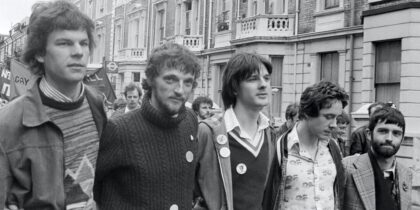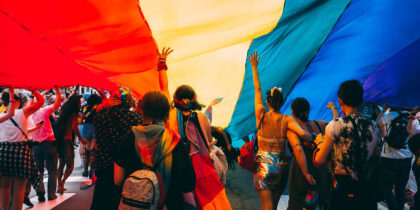There’s a memory sitting at the forefront of my mind this World AIDS Day, the recollection of a fleeting moment that I’d like to share.
In the earliest days of Covid, almost four years ago, a director in the organisation I was then working for spoke to us all on a weekly basis from the comfort of his sitting room. He thanked us for our commitment to the work, commended us on our professionalism in moving so swiftly to working remotely, and acknowledged the challenges in keeping the show on the road. Our achievements were of particular note, he said, because ‘none of us have ever lived through a pandemic before’.
It would be churlish to criticise his leaderly intentions in such trying and frightening times. The burden on the NHS was unprecedented – which had direct impacts on our work as a healthcare regulator – and the uncertainty about what was happening weighed down upon us. And we were enjoined in a common desire to minimise the impact of coronavirus, as we then called it, and get back to normal as soon as possible.
However, his words – despite the gravitas and care with which they were shared – missed the mark for me, at least in part, because Covid was not the first pandemic I had lived through. The HIV pandemic, which has killed more than 40 million people worldwide, has been a reality for me – as a gay man who came out in the 80s, through to my own infection more than 20 years later, and subsequent stays in hospital because of the life-threatening illnesses that I have since endured. The HIV pandemic is one that I – and no doubt, others sitting listening to our director’s pep talk – will continue to experience, as I start each day with antiretroviral meds and then navigate others’ conscious and unconscious prejudices until bedtime.
The manifold challenges that I face as a gay man with HIV – a heady mix of homophobia and heterosexism, ableism, and moral panic – are part of a rich mosaic of experiences that have formed who I am and have deeply influenced my mental health, for good or ill.
Some, like in the story I have just shared, are memorable and frustrating, yet fleeting, and actually cause me minimal harm. Others are violent and leave a painful legacy, like my memories of the 80s when politicians, media and clergy castigated people in the throes of death as perverts, sinners and degenerates; or like last year, when some guy spat on me as I left a clinic in central London. ‘Dirty queer,’ he said, and then disappeared in a matter of seconds. Some come from unexpected quarters, like other gay men on dates or in social situations. ‘So how did you get it?’ one asked. ‘Are you a slut?’ Others are systemic and deeply unsettling, like the continued criminalisation, imprisonment and deportation of people with HIV in countries across the world. Some are difficult to fathom, like the erasure of people with debilitating and disfiguring HIV-related diseases in the images used to show the effects of antiretroviral medications.
Perhaps the hardest of all are the stories that I tell myself in moments of fear, depression or anxiety – shameful, self-censoring, full of regrets – that are given life by the stigma, prejudice and hate that surround us.
There are, of course, pieces in the mosaic that bring relief and sparkle too, fragments of experiences that give me hope and build my confidence, offer me protection, and keep my mental health above the line. The love of friends and family. The support of my employer and colleagues. The compassion of my therapy group. The care of my clinical team. The connections I have with other people with HIV. The sense of belonging I share with other LGBTQ+ people. The courage I have found to speak out. The hope of a fulfilling future. My focus on living well in the present.
The HIV pandemic has a 40-year global history. It has changed over time, and is still changing, and will continue to change. The UN theme for World AIDS Day 2023 is ‘Let Communities Lead’ which underscores the importance of putting front and centre the various stories of men and women with HIV. It highlights the centrality of designing interventions that meet our needs – a critical element of which is mental health and wellbeing, so intrinsically bound into who we are, how we are treated, what we can be. There is a lot to be learnt from us, and from those who support us: the diverse and polychromatic mosaics of our lives.






